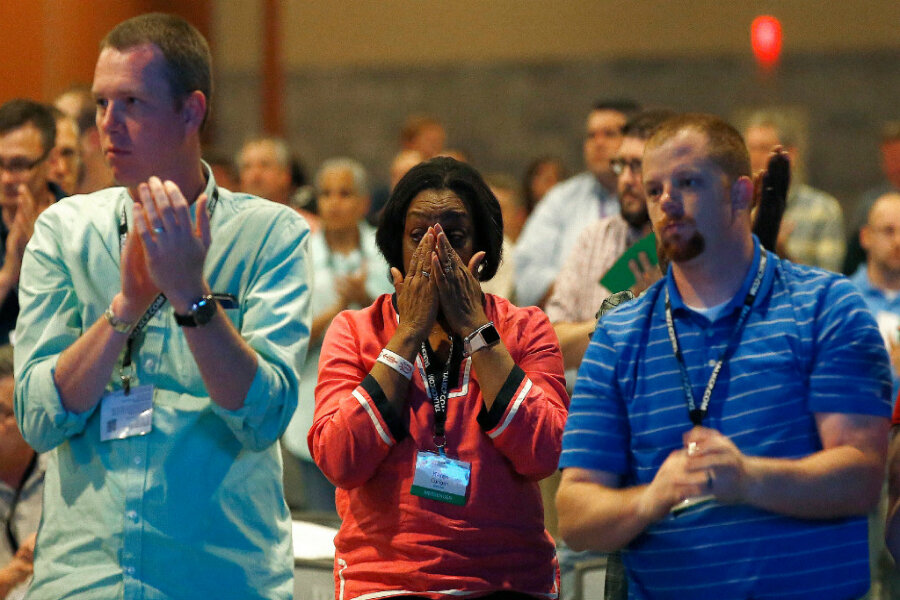Southern Baptists reach consensus, denouncing ‘alt-right’ movement
Loading...
| Pheonix
Southern Baptists on Wednesday formally condemned the political movement known as the "alt-right," in a national meeting that was thrown into turmoil after leaders initially refused to take up the issue.
The denomination's annual convention in Phoenix voted to "decry every form of racism, including alt-right white supremacy as antithetical to the Gospel of Jesus Christ" and "denounce and repudiate white supremacy and every form of racial and ethnic hatred as a scheme of the devil."
Tuesday night, Southern Baptist officials who oversaw the resolutions had refused to introduce a different repudiation of the "alt-right," which emerged dramatically during the US presidential election, mixing racism, white nationalism and populism.
Barrett Duke, who leads the resolutions committee, had said the original document contained inflammatory and broad language "potentially implicating" conservatives who do not support the "alt-right" movement.
Introducing the new statement Wednesday, Mr. Duke apologized "for the pain and confusion that we created," but said the committee had been concerned about potentially giving the appearance of hating their enemies. Duke said the committee members "share your abhorrence of racism" and were grateful for the chance to "speak on 'alt-right' racism in particular and all racism in general."
The resolution was adopted after a short but emotional discussion.
"We are saying that white supremacy and racist ideologies are dangerous because they oppress our brothers and sisters in Christ," said the Rev. Russell Moore, who leads the Ethics & Religious Liberty Commission, the Southern Baptist public policy arm. "If we're a Jesus people, let's stand where Jesus stands."
Charles Hedman of Capitol Hill Baptist Church in Washington, said far-right groups had been distributing racist material outside the convention hall Tuesday night. He said some pastors had told him they would have to leave the denomination if the convention failed to denounce white supremacy Wednesday.
"We must stand strong," Mr. Hedman said. "We must all issue an apology that we didn't act on this yesterday."
The initial proposal that Southern Baptists had rejected came from a prominent black Southern Baptist pastor, the Rev. William McKissic of Arlington, Texas. His resolution repudiated "retrograde ideologies, xenophobic biases and racial bigotries of the 'alt-right' that seek to subvert our government."
After Mr. McKissic made an unsuccessful plea for reconsideration from the floor of the Phoenix meeting late Tuesday, pressure began building online and at the convention for the Southern Baptists to say something.
Several Southern Baptists were panicked, contending that silence would be misinterpreted as support for white supremacy. The denomination was formed in the 19th century in defense of slaveholders and has been trying to overcome its racist history.
A late-night call went out for convention participants to return to the assembly hall, where Steve Gaines, the president of the Southern Baptist Convention, won approval to consider a new resolution on the topic Wednesday.
"It shows we're willing to bring issues to the floor, real issues," said Mark Croston, national director of black church partnerships for the Southern Baptist-affiliated Lifeway Christian Resources. "We're not intimidated or afraid to speak out, even though it brings up dirty laundry from the past."
The Southern Baptist Convention, based in Nashville, is the largest Protestant denomination in the country, although its membership has been shrinking, most recently dropping to 15.2 million members.
Leaders have been trying to diversify, repeatedly condemning racism in formal resolutions from past meetings, rejecting display of the Confederate flag and electing more black officers. As of 2014, the denomination was about 85 percent white, according to the Pew Research Center.
Duke later apologized personally to McKissic for how his original proposal was handled. McKissic was not consulted when leaders were drafting the new statement, but said he was encouraged by the outcry from white and black Christians that brought the issue to a vote. "We're turning the corner," McKissic told reporters. "I see the heart of the majority."
Debate also underscored ongoing tensions among Southern Baptists whether President Trump, a thrice-married casino and real estate mogul, was morally fit to be president.
Mr. Moore vehemently condemned candidate Mr. Trump. At the same time, several prominent Southern Baptists, including former presidents of the denomination, signed on as evangelical advisers to the Republican's campaign. They remain among the president's most steadfast supporters.
When Trump won with 80 percent of the white evangelical vote, Moore faced a backlash within the denomination. That landslide support for Trump left black evangelicals feeling alienated and disappointed given their concerns about Trump's past treatment of blacks, his rhetoric about Mexicans, and his promised policies.







